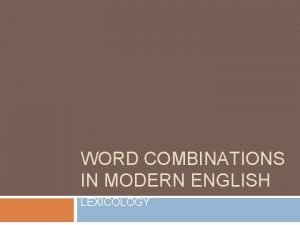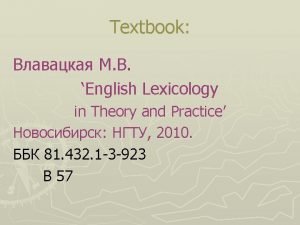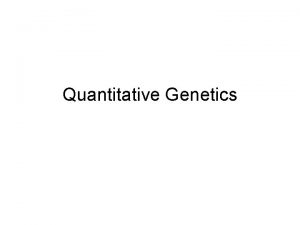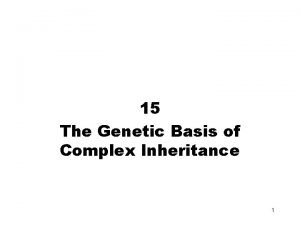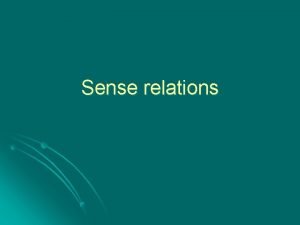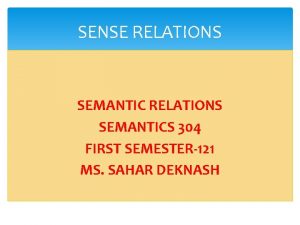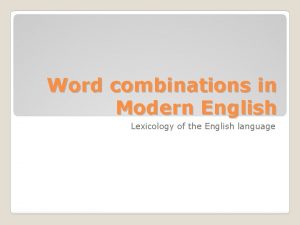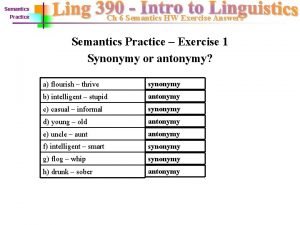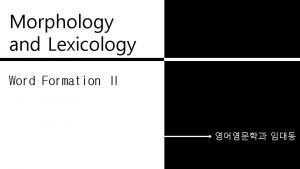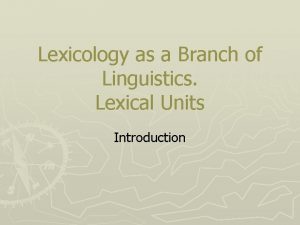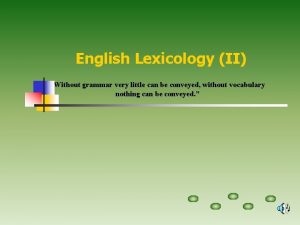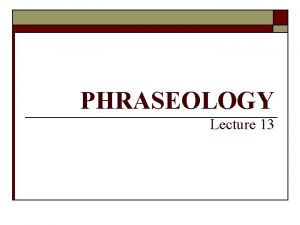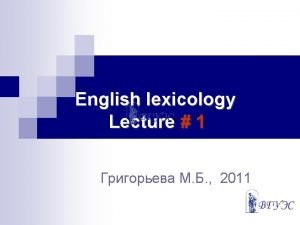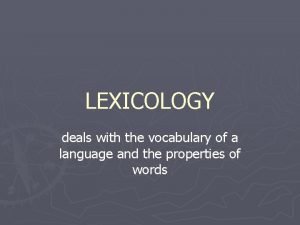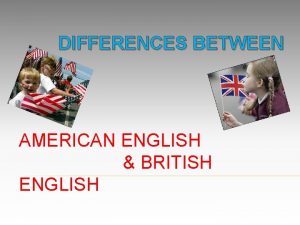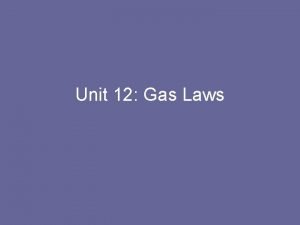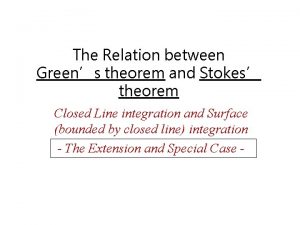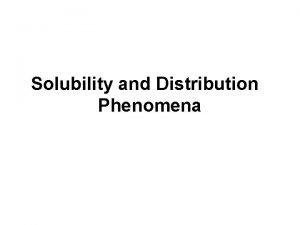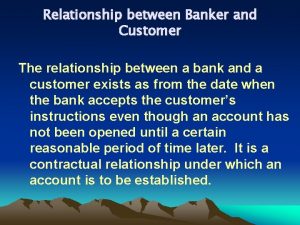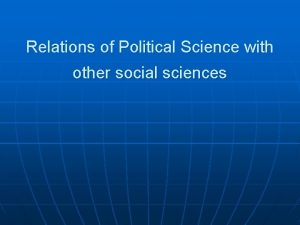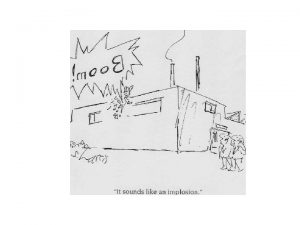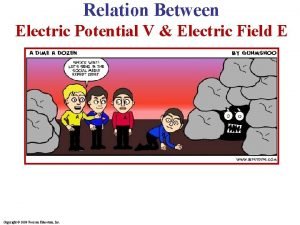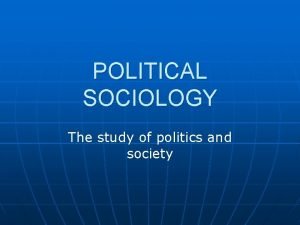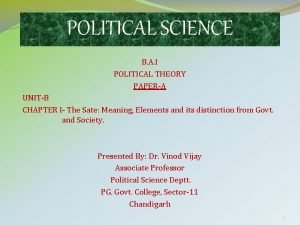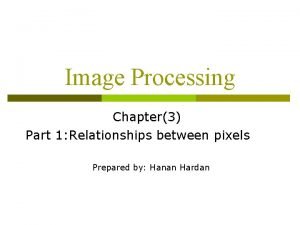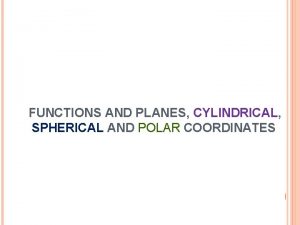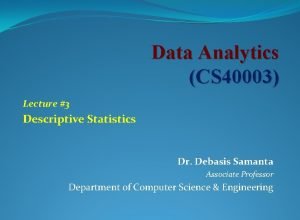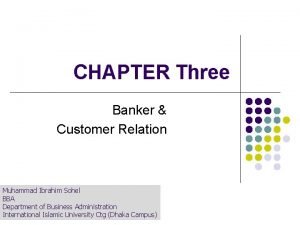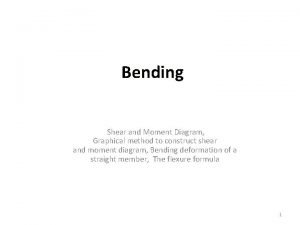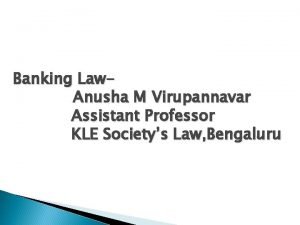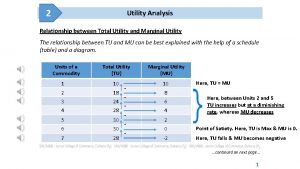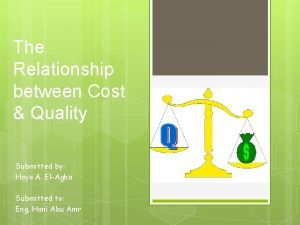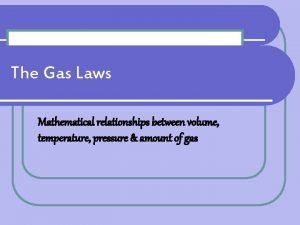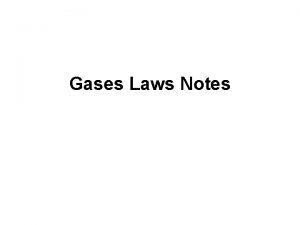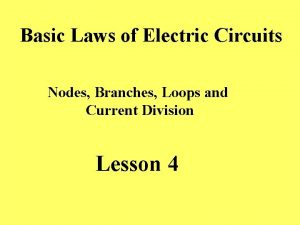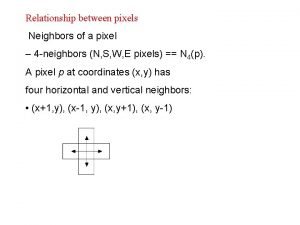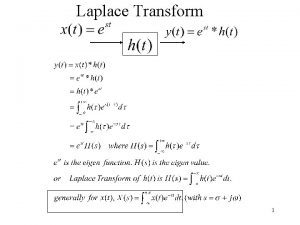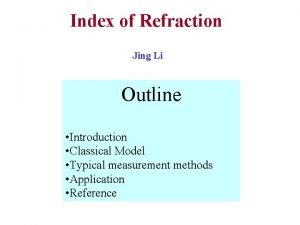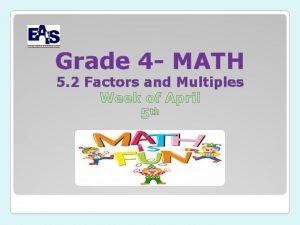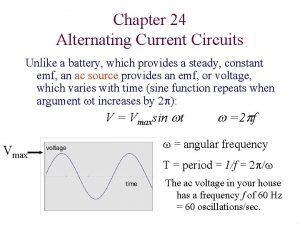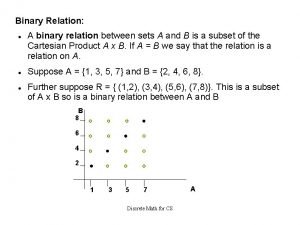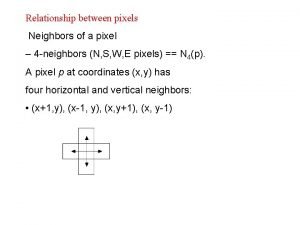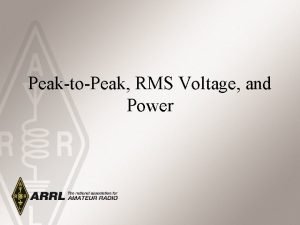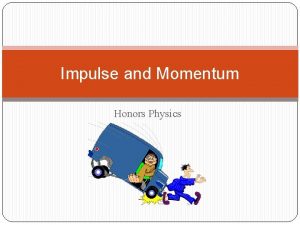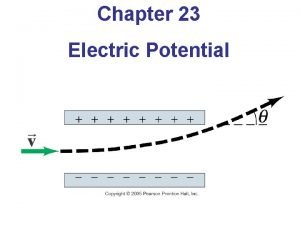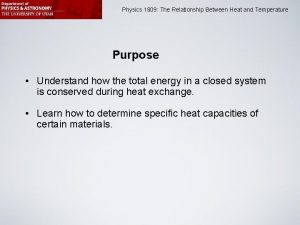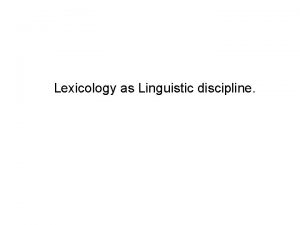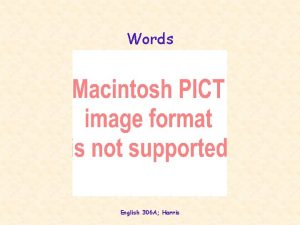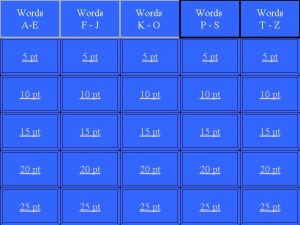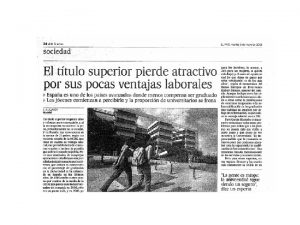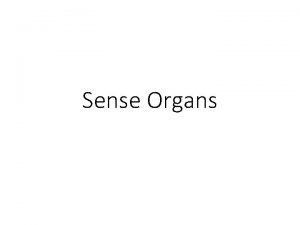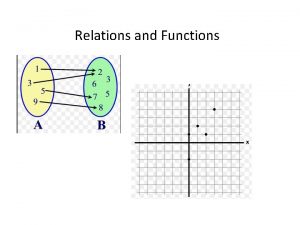English Lexicology Lecture 6 Sense Relation between Words

English Lexicology Lecture 6 Sense Relation between Words

Review n Last week… n n Word meaning and motivations Types of meaning

This week: Sense Relation between Words objects --better understand the relation between words --appreciate words used in discourses --enable learners to use words effectively

Contents n 1. Synonymy 同义关系 synonym 同义词 n 2. Antonymy 反义关系 n n 3. Polysemy 多义关系 polyseme 多义词 4. Homonymy 同音(同形)异义关系 q q q n antonym 反义词 homonym 同音同形异义词 homograph同形异义词 homophone同音异义词 5. Hyponymy 上下义关系 q q superordinate 上义词 hyponym下义词

1. Synonymy Ø Ø Ø Contents 1. 1. definition of synonymy 1. 2. source of synonyms 1. 3. kinds of synonyms 1. 4. effects of synonyms 1. 5 exercises

1. 1. definition of synonymy n n Synonymy is a relationship of ‘sameness of meaning’ that may hold between two words. Synonym: a word that means the same/ similar as another.

1. 2. source of synonyms n English has the most synonyms of any language in the world. Why are there so many synonyms in English?

Why are there so many synonyms in English? q 1. The primary reason for this has to do with the heavy borrowing from other languages, especially from French and Latin. English ask time belly fire French question age stomach flame Latin interrogate epoch abdomen conflagration

2. The second reason: Dialects and regional English lift elevator tube subway petrol gasoline call box telephone booth charm glamour (Scot. E)

3. The third reason: Figurative and euphemistic of words occupation walk of life dreamer star-gazer drunk elevated lie distort the fact

4. The forth reason: Coincidence with idiomatic expressions pick up choose give up abandon go on with continue put off postpone win gain the upper hand be in two minds hesitate

1. 3. kinds of synonyms n Linguists make a distinction between ‘strict’ or ‘absolute’ synonymy and ‘loose’ or ‘relative’ synonymy.

Strict synonymy n Strict synonyms refer to two words which are identical in meaning in all its aspects. They are interchangeable in all contexts. n Strict synonyms are very rare, and some linguists even argue that strict synonyms do not exist. n Strict synonymy is uneconomical; it creates unnecessary redundancy in a language.

Strict synonymy scarlet fever--- scarlatina word formation--- word building motherland--- fatherland mother tongue--- native language

Loose synonymy n When we speak of synonymy, we mean ‘loose’ or ‘relative’ synonymy, where we find not only a significant overlap in meaning between two words, but also some contexts where they cannot be used interchangeably. discover: be the first one to come across something John found/discovered the basketball the grass. find: experience something in in some way Maria Curie discovered radium in 1898. *Maria Curie found radium in 1898.

Distinguishing synonyms n We often take the following things into consideration when we try to find the differences between synonyms. q q q In English and American usage Different stylistic meanings Different connotative/emotive meanings In shades of meaning In the range of use In collocation

Synonyms In English and American usage n Some synonym pairs differ in that they belong to different dialects of English. Here are some examples of synonyms from British and American English: Br. E lift Am. E Br. E elevat or lawye attorn r ey rubbis garba h ge Am. E farm ranch biscui t pave ment cooki e sidew alk

Synonyms with different stylistic meanings n One of a pair of synonyms may be used in a more formal context than the other. Here are some examples of synonym pairs. Informal Formal die decease daddy father blame chide guy man west occidental praise eulogy

Example They made a decision to abandon the project. They decided to walk out on the project.

Synonyms with different connotative meanings n Synonyms may have different emotive associations (connotative meanings). famous notorious misuse (disreputably) ambiguous equivocal new (deliberately) hate loathe obtain (with disgust) abuse (of privilege or power) novel (strikingly) procure (with effort)

Eg. Nigger (impolite) → Negro (neutral) → Black (commendatory) Distinguish the following groups of synonym thrifty, miserly, niggardly, frugal; bravery, foolhardiness; firm, pigheaded;

In shades of meaning q finish, complete, close, conclude, end, terminate, finalize n Finish vs complete n Close, conclude (final stages that complete an action) n End, terminate (more general, may happen before a task is completed) n finalize

-----let, allow, permit -----want, wish, desire -----rich, wealthy -----big, large, huge Cool-----chilly-----cold-----frosty-----frigid-----icy

Synonyms different in range of use n n Eg. On VS. about: with regard to/ concerning On (book, article, lecture, etc. ) About (more general)

Synonyms Different In Collocation n n accuse…of… vs. charge …with… Rancid vs. addled Rancid bacon/ butter Addled eggs or brains pretty (girl, child, flower, garden, color, village, cottage) handsome (boy, man , car, table, overcoat, airliner, house) a flock of sheep, a herd of elephants, a shoal of fish, a swarm of bees; to sail a small boat, to navigate a liner;

1. 4. effects of synonyms n Do you know the significance of studying synonyms? n Eg. We are hungry for a life that turns us on; we yearn for a knowledge of living that will save us from our innocuous lives that resemble death. We look for signs in every strange event; we search for heroes in every unknown face. (A Walker, The Civil Rights Movement)

n n Avoid repetition General------specific( achieve precision ) n n Say/speak: murmur, scream, retort, argue, protest, claim, state, declare Monotony----vividness n Barbie doll’s fashion: fashions, costumes, outfits, apparel, dress…. .

1. 5 Exercises: Discrimination of synonyms abolish, cancel, extinguish, eliminate q q The losing team was eliminated from further competition. Firefighters extinguished a big fire. The meeting has been cancelled because of the flu. The government abolished the tax on alcohol.

Discrimination of synonyms abstract, outline, summary q q q She made an outline of ideas she wanted to present in her talk. I have read the abstract of his book. The chemistry book had a summaryat the end of each chapter.

ambiguous, obscure, vague, unclear, dim q q q unclear It is whether the economy will get better. His changes of recovery from illness are. dim vague ideas about what to do, He has some but nothing specific. His ambiguous directions confused us; we did not know which of the two roads to take. The poetry of Ezra Pound is sometimes difficult to understand because it contains so many obscure _____references.

normal, ordinary, simple, common. n Listen carefully and take some notes to distinguish this group of synonyms.

n n n 用common 这个词来形容椅子的时候,其含义是常见的。 这是一把很常见的椅子 normal 和 ordinary 表示普普通通,普通的而不是特制 的椅子。 如果要强调这把椅子的 艺简单不复杂,那就是simple. 简易的。 simple things aren’t always ordinary. the opposite of normal is strange, and the opposite of ordinary is special.

2. Antonymy Contents 2. 1. definition of antonymy 2. 2. types of antonyms 2. 3. use of antonyms

2. 1. definition of antonymy n n Antonymy is a relationship of ‘meaning opposition’ that may hold between two words. Antonyms can be defined as words which are opposite in meaning.

2. 2. types of antonyms n Morphological classification n root antonyms derivational antonyms Semantic classification n Contraries/ Gradable 相对反义词 Complementaries 互补反义词 Conversives 换位反义词

Contraries n Contraries include pairs like the following: Antonyms of this type are best viewed in terms of a scale running between two poles or extremes. The two opposites are gradable. hot, warm, cool, cold beautiful, pretty, good-looking, plain, ugly old-young, open-close, big-small, poor-rich

Contradictory (complementary) antonyms n Contradictory antonyms include pairs like the following: These pairs are called asleep dead on remember win true awake alive off forget lose false contradictory antonyms because they represent an either/or relation. If you permit some behavior, then it is not forbidden. Since they are not gradable, they do not allow comparison

Converse antonyms (逆行) n The following are examples of converse antonyms: lend husband above before behind buy give parent speak borrow wife below after in front of sell receive child listen Lend is the converse of borrow and vice versa; i. e. the substitution of one member for the other does not change the meaning of a sentence if it is accompanied by the change of subject and object. John lent Mary five dollars. Mary borrowed five dollars from John.

Contradictory antonyms vs. Converse antonyms The bridge is above the river. The river is below the bridge. This behavior is allowed. This behavior is not prohibited. Converse antonyms are relational antonyms. Contradictory antonyms are either/or antonyms.

2. 3. use of antonyms n A word can have more than one antonyms q q n Fresh bread------stale bread Fresh air-----stuffy air Fresh flowers-----faded flowers Fresh look----tired look Purpose of using antonyms

Purpose of using antonyms q q To achieve emphasis by putting contrasting ideas together To express economically the opposite of a particular thought. q I despise its very vastness and power. It has the poorest millionaires, the littlest great men, the haughtiest beggars, the plainest beauties, the lowest skyscrapers, the dolefulness pleasures of any town I ever saw. (By O. Henry)

3. Polysemy n contents: Ø Ø 3. 1. definition of polysemy 3. 2. processes of sense-shift

3. 1. definition of polysemy n n n When a word is first coined, it is always the case (true) that it has only one meaning (monosemic). But in the course of development, the same symbol may be used to express new meanings. The result is polysemy. Polysemy shows the economy and efficiency of human languages. Polysemy: the same word may have a set of different meanings.

Two processes leading to polysemy n There are two important processes in the development of meaning: q q Radiation (发散) Concatenation(串联)

Radiation n n Radiation is a process in which the primary meaning stands in the center, and the derived meanings radiate from it in every direction like rays. All the derived meanings can be traced back to the primary meaning. 7 6 2 1 5 3 4

Radiation Example: face a person (Derived Meaning) We can get the derived meanings by extension, narrowing, analogy, transfer, etc. self-respect outward appearance (Derived Meaning) the front of the head (Derived Meaning) (Primary Meaning) countenance (Derived Meaning) the surface of a thing (Derived Meaning)

Concatenation n n Concatenation is a process in which the meaning of a word moves gradually from its primary meaning by successive shifts, like the links of a chain, until there is no connection between the meaning that is finally developed and the primary meaning. Unlike radiation where each of the derived meaning is directly related to the primary meaning, concatenation is a process where each of the later meaning is related only to the preceding one. 1 2 3 4 5 6

Concatenation Example: candidate A A+B B a person dressed in white a white robed applicant for office (because the Romans wore white bridging robes when standing for office) context a person taking an examination There is no connection between A and B, because the middle link (A+B) has vanished. The primary meaning A has also vanished. Now the derived meaning has become the central meaning.

4. Homonymy n contents n n 4. 1 definition of homonyms 4. 2 classification of homonyms 4. 3 ways of forming homonyms 4. 4 stylistic value of homonymy and polysemy

4. 1 definition of homonyms n n Homonymy is the relation between two words that are spelled or pronounced in the same way but differ in meaning. Such words are called homonyms.

4. 2 classification of homonyms q perfect homonyms -- lie vi. / lie vi. n n q Words identical in sound and spelling but different in meaning Words identical in both sound-form and parts of speech but different in meaning Partial homonyms n homographs—tear n. / tear vt q n My tears can tear down the wall homophones-- hoarse/horse q The man riding a horse has a hoarse voice

Perfect homonyms n Perfect homonyms: words identical in both sound and spelling, but different in meaning q q bank: n. / bank: n. bear: n. / bear: vt.

Homographs n Homographs: words identical only in spelling but different in sound and meaning. q q q bow: vi. to bend one’s head as a greeting bow: n. the device used for shooting arrows sow: n. female pig sow: vi. to scatter seeds perfect: v. /- ’-/ perfect: adj. /’- -/

Homophones n Homophones: words identical only in sound but different in spelling and meaning. q q q sun/son deer/dear right/write pair/pear stationary/stationery

Differentiation of perfect homonyms from polysemous words having different sources perfect homonyms developed from the same source polysemous words the same lexeme which has several different meanings different lexemes which have the same form

4. 3 ways of forming homonyms n n n a. converging sound development音变的汇合 (coming from different origin) sea see bean been /ei/ /i: / b. diverging sense development词义分化 flower/flour ( same word in old english) C. foreign influence, eg. fair (OE) attractive (Lat. ) gathering…

4. 4 stylistic value of homonymy and polysemy n n Polysemous words and homonyms are often used as puns, to achieve certain literary effect, such as humor, irony, etc. Lewis Carroll’s Alice’s Adventure in Wonderland “How is bread made? ” “I know that!” Alice cried eagerly. “You take some flour. ” “Where do you pick the flower? ” the White Queen asked. “In a garden, or in the hedges? ” “Well, it isn’t picked at all, ” Alice explained: “it’s ground. ” “How many acres of ground? ” said the White Queen.

n On Sunday they pray for you and on Monday they prey on you Sue watched the eagle as it flew. But Sue got sick and caught the flu, So she built a fire and set the chimney flue.

5. Hyponymy Contents 5. 1. definition of hyponymy 5. 2. superordinate上义词and hyponym下义词 5. 3. use of superordinate and hyponym n

5. 1. definition of hyponymy n Hyponymy is the sense relationship that relates words hierarchically. The underlying observation is that some words have a more general meaning, while others have a more specific meaning, while referring to the same entity. We are not going to have any food today. FOOD MEAT We are not going to have any vegetables today. VEGETABLE

5. 2. superordinate and hyponym n superordinate or upper term: ---the more inclusive words n n n e. g. furniture : bed, table, sofa. chair (co-hyponym共下义词) hyponym, lower term or subordinate: ---the more specific words

They are subordinate terms. They are hyponyms of the superordinate term FOOD. superordinate FOOD FRUIT MEAT BEEF PORK VEGETABLE MUTTON They are subordinate terms. They are hyponyms of the superordinate term MEAT. CABBAGE APPLE PEACH CELERY SPINACH ORANGE Reading from the bottom of the hierarchy, ORANGE is a ‘kind of’ fruit, which is a kind of food.

5. 3. use of superordinate and hyponym n n General terms often result in vagueness and triteness. Specific words can add force , clarity, and evoke vivid pictures

Home work n n Recite 3. 3. 5 in the textbook Check email
- Slides: 64
